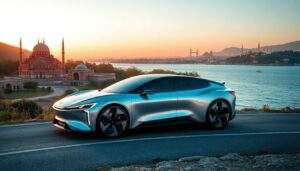Introduction
Electric cars (EVs) are taking over the world. From ecocity to global marketplace, EVs are changing the face of transport. Strategically positioned between Europe and Asia, Turkey is positioning itself to be at the epicenter of the shift. The government is promoting cleaner travel as the economy grows, and the need for new innovations. For investors, manufacturers, and everyday commuters, understanding Turkey’s EV sector isn’t just smart—it’s vital to success.
Market Overview and Current Electric Vehicle Situation in Turkey
Market Size and Growth Trends
Turkey’s electric vehicle market is growing rapidly. In 2023, sales increased by over 150% compared to the previous year with positive momentum. EVs still hold a mere 2% of automobile sales in total, but that figure is climbing rapidly. Turkey’s EV uptake is faster than its neighbors, such as Greece or Bulgaria, thanks to supportive policy and local interest. Traditional cars are still dominant, but EVs are picking up pace rapidly.
Regulatory Framework and Government Policies
The Turkish government has set certain goals to promote electric vehicle adoption. They offer tax exemptions and incentives to buyers of EVs. New policies encompass discounted registration fees and subsidies to EV buyers directly. Turkey’s National Electric Vehicle Strategy is keen on having 30% of new vehicles sold to be electric by the year 2030. The strategy encourages automakers to invest locally and brings down the price of EVs for customers.
Infrastructure Expansion and Charging Network
Charging stations are popping up across Turkish cities. Plans are under way to build fast-charging stations along motorways in order to allow for long-distance travel. The nation has around 2,000 charging stations today. The private sector is joining forces with city authorities to expand this figure. The problem remains in the countryside where charging stations are scarce. However, ambitious plans to expand infrastructure could have charging stations double in size within five years.
Key Players and Local Manufacturers of the Turkish EV Industry
Local Automotive Manufacturers
The Turkish pride in EV innovation is TOGG, Turkey’s very own electric vehicle project. They are going to launch several models, both for city residents and families. TOGG is going to manufacture 175,000 electric cars annually by 2025, so it is a serious contender. Other than TOGG, there are other local companies thinking of electric versions of popular existing models to meet growing demand.
International Automakers and Their Strategies
The majors like Renault, Hyundai, and Tesla are already in Turkey. Renault’s Zoe continues to be popular since it is economical. Hyundai is introducing more versions of Ioniq, and Tesla uses its top-end models to attract top-end buyers. They are making big investments in local dealerships and service centers, realizing the growth prospects of Turkey.
Supply Chain and Components
Domestic manufacture of EV parts is starting to gain pace. Manufacturing plants for batteries are opening, reducing import dependence. Companies like TUSAŞ are involved in sourcing batteries and other critical components locally. This shift can lower the costs of vehicles and improve delivery timelines, giving Turkish consumers more choice.
Consumer Trends and Market Dynamics
Consumer Adoption Factors
Price remains a big issue among most consumers. Many of them ask, “Will it cost me less?” Range anxiety is another thing—drivers worry that the vehicle will run out of charge far from charging stations. But as charging becomes easier and EVs become cheaper, more and more people are becoming willing to switch. And awareness about climate change motivates young consumers to opt for cleaner options.
Electric Vehicles in Public and Commercial Sectors
Taxis, ride-sharing fleets, and ride-hailing fleets are all going electric. Electric bus programs have been started in many cities that are saving costs and lowering pollution. An example is Istanbul’s recent effort to switch aging taxis with electric taxis. Commercial pilots prove EVs are effective and cost-effective even for demanding city conditions.
Challenges and Barriers to Growth
Despite progress, there are still challenges. Charging points need to proliferate rapidly, especially in small villages. The initial purchase price of EVs can be prohibitively costly for the majority of consumers. Certain customers also do not actually understand the benefits or are scared of transforming everything. Regulation is improving, but further modifications are needed to bring acceleration.
Future Prospects and Investment Opportunities
Market Forecast and Projections
Industry experts have stated that Turkey’s EV market will grow ten times larger by 2030. Final numbers can reach up to 150,000 new annual sales of EVs, creating a huge new industry. Exporting to neighboring countries like the Middle East and parts of Europe is also likely, considering the strategic location of Turkey.
Innovation and Technological Trends
Battery technology is advancing. Better batteries and faster charging are the new standard. Shareable smart cars linked to apps and urban infrastructure are catching on, making EVs easier to own. Integration of renewable energy is also gaining momentum, powering EVs with cleaner electricity.
Policy and Investment Recommendations
To speed up, the government needs to continue offering incentives and relax the regulations. Investors can look for domestic battery manufacturers or charging station companies. Partnerships between public agencies and private companies could provide new avenues. Incentives to R&D can also catalyze innovation, allowing Turkey to bridge the gap with leaders around the world.
Conclusion
Turkey’s EV sector is just getting into its stride. Backed by the government, investors’ interest, and more and more charging points, the prospects are rosy. Infrastructure development, cost decreases, and adopting new technology are the building blocks that can deliver optimum potential. Turkey has the potential to be a regional EV power, and all—car buyers to the environment—are able to gain. Now is the time to observe this space unfold.




